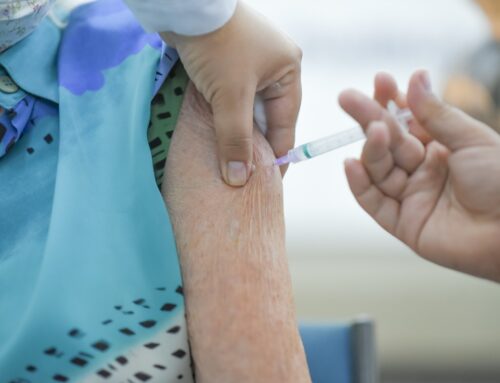A strange omicron variant symptom has emerged as COVID-19 has continued to spread across the country.. Dr. John Torres, NBC News senior medical correspondent, told the "Today" show that one of the most common COVID-19 symptoms loss of taste and smell has not been common among omicron variant patients.. Smell is one of the senses our body uses to look for danger, such as smelling smoke from a fire, Wu stated, so a persistent change in smell can potentially be a safety concern as well.. Still, CDC data showed the most common symptoms so far are cough, fatigue, congestion and a runny nose. How does COVID-19 cause people to lose sense of smell? And how many Lung. COVID-19 Symptoms Usually Show Up in This Order, The Unusual COVID-19 Symptoms You Can Miss, Long-Haul COVID-19 Symptoms May Appear in This Order. Analysis of the roles of smoking and allergy in nasal polyposis. A review of nasal polyposis. None of the subjects had experienced severe cases, or had any signs of acute infection when they were tested for antibodies, and they had no lingering symptoms other than a potential loss of taste or smell. While its understandable to panic with every new wave, Omicron wont likely be the last wave we see, especially since there are COVID-19 outbreaks in places all over the world. Get the Android Weather app from Google Play, How to avoid getting a fake N95 or KN95 mask, smell and taste loss associated with omicron, 48% of infected people were reporting loss of taste or smell, Experts warn against using Benadryl and milk to treat COVID, despite NC lawmakers post, Best athletic wear for kids joining baseball and, How to watch all the Oscar-nominated movies in style, Best smart home devices for older users, according, Indiana man arrested in North Carolina for theft,, Person in critical condition after east side shooting, Bryce Young falls short: 5-10 . Does Omicron Cause Loss of Taste and Smell? - NBC Chicago Researchers used a national database of over 3.5 million cases of patients who tested positive for COVID-19 since the onset of the pandemic. Access your favorite topics in a personalized feed while you're on the go. Dr Angelique Coetzee, who runs a private clinic in Pretoria, said it does not cause loss of taste or smell like previous versions of Covid. Overall, almost two-thirds of participants reported either an impaired sense of smell or taste, and 58 percent said both senses were altered by the virus. The olfactory disorders (disorders affecting smell) are: Hyposmia : A reduced ability to smell Anosmia : Total loss of smell Parosmia : A change to the sense of smell. Less than 20% of people with COVID-19 in the UK are reporting loss of smell. Omicron May Be Less Likely To Cause Smell Loss Than Other - Forbes This symptom, which can last for weeks to months, has become one of the diseases most infamous ailments. A new study has found newer variants of COVID-19, like omicron, are less likely to cause smell and taste loss. However, further investigation into these is required. Until recently, many people with the disease reported trouble detecting strong scents, like perfume, or tasting sweet, bitter, or spicy foods that went beyond the sense-diminishing symptoms associated with the common cold. Doty, R. L., et al. Omicron Symptoms: Here's How They Differ From Other Variants Omicron Covid does NOT cause loss of taste or smell but has - The Sun Omicron has only a 17 percent chance of smell and taste loss, compared to 44 percent for delta and 50 percent for the alpha variant. Scientists aren't sure why the symptom is rarer now that Omicron is spreading. Omicron and its Subvariants: A Guide to What We Know Researchers have found that women are slower to recover their sense of taste and smell than men. The loss of taste and smell or changes to those senses can present in a variety of ways. RELATED: What to Do When COVID Kills Your Sense of Smell and Taste. If youve ever been allergic to anything pollen, pets, or even dust you may have noticed that your symptoms are similar to a cold. But did you know that these medications can also affect your sense of taste? This Is When Youre Contagious, The Vital Role Our Senses Play In COVID-19 And Beyond. This information is for informational purposes only and is not meant to be a substitute for professional medical advice, diagnosis or treatment. The loss of smell and taste appears to have been a symptom that was more common earlier in the pandemic when other variants of SARS-CoV-2 were spreading. Fewer people experiencing these symptoms means fewer people being impacted by mood changes and cognitive problems.. You may also notice that foods dont taste the same as they used to or that you cant smell things as well anymore. Does omicron cause loss of smell or taste? | NewsNation Our research shows that more than 50% of people suffering from smell and taste loss have reported feeling depressed. The Food and Drug Administrations independent vaccine advisory committee voted unanimously in favor of having all COVID-19 vaccines in the United, You may wonder whether supplementing with vitamin D can help reduce your risk of contracting the new coronavirus that causes COVID-19. In a recent Nebraska omicron outbreak, five people were reinfected with COVID-19, according to a report from the CDC. Add Changing America to your Facebook or Twitter feed to stay on top of the news. Her comments echo those seen as the omicron surge first took hold in South Africa. But a small 2020 study found that participants with COVID-19 lost their sense of smell even when they could breathe freely and their noses weren't runny or congested. When the Delta variant was running rampant, 34% of people reported these symptoms. The UK ZOE study estimates about one in five people report smell or taste loss with omicron. Smell and taste loss less likely with newer COVID-19 variants Healthline Media does not provide medical advice, diagnosis, or treatment. America is changing faster than ever! Israel Still Not Sure Omicron Causes Milder Illness, Despite - Haaretz And it soon became clear that, for some, this symptom was lasting long after the infection had passed. (2020). Of the 81 people who were infected, 12% reported reduced smell and 23% reported reduced taste. document.getElementById( "ak_js_1" ).setAttribute( "value", ( new Date() ).getTime() ); Copyright 2023 Nexstar Media Inc. All rights reserved. In general, youll get back to smelling and tasting normally once the infection has resolved. Smoking and olfactory dysfunction: A systematic literature review and meta-analysis. Four of the individuals experienced loss of taste or smell during their. Meanwhile, scientists continue investigating other approaches that could aid in restoring these senses among COVID patients. Loss of olfactory functionEarly indicator for Covid-19, other viral infections and neurodegenerative disorders. Coelho and Costanzo are also leading a team to. A new poll finds that there may be a specific order for long-term COVID-19 symptoms. A January 2021 study found that 86% of people with mild COVID-19 cases across 18 European hospitals had a reduced sense of smell. Dr. Angelique Coetzee, the South African doctor who sounded the alarm on the omicron coronavirus variant, said at the beginning of the omicron variant wave that the symptoms are re often very, very mild compared to previous COVID-19 strains, per Al Jazeera. Sometimes what affects your sense of taste isnt a specific drug, rather its from taking many medications at once. If you suddenly experience a loss of taste or smell and think you have COVID-19, make sure to get tested. Loss of smell and taste is a concern for many COVID-19 patients, and dysfunction can last for extended lengths of time. Some loss of taste and smell is natural with aging, especially after age 60. The researchers theorized that loss of taste or smell may be related to the coronavirus interfering with the nervous system. First of all, theres the obvious: enjoyment of food. By signing up, I agree to GoodRx's Terms and Privacy Policy, and to receive marketing messages from GoodRx. After an outbreak at a Christmas party in Norway, just 23% of people infected with Omicron reported reduced taste, and 12% reported reduced smell, compared with 83% who reported a cough and 78% who reported a runny or stuffy nose. But more recent variants, including other Omicron subvariants, haven't caused the symptom as often. Even without COVID-19, the clinic estimated more than 1 in 10 Americans may have a smell or taste disorder. In a recent Nebraska omicron outbreak, five people were reinfected with COVID-19, according to a report from the CDC. Laryngoscope. Areas of the brain that help you smell also change with age. Schneller, L. M., et al. And they can even damage the lining of the nose to the point where some people lose their sense of smell for a few years. Rhinology. Viruses for the cold, flu, and COVID-19 can cause these symptoms to happen quickly and can last for 1 to 2 weeks. Omicron subvariant symptoms: How quickly do omicron symptoms appear? (1997). They can cause swelling in the nose. With the original variant of COVID-19, about 48% of infected people were reporting loss of taste or smell, a review of 27 medical studies found. Studies have also explored whether nasal or oral steroids could be beneficial in helping people regain their sense of smell, but findings are mixed and relatively limited, and more research is required. The study also wasnt a controlled experiment designed to prove whether the loss of taste and smell directly causes higher antibody levels or that it always helps prevent future infections. Handbook of Clinical Neurology. Scientists explore how omicron symptoms differ from other COVID signs - NPR Researchers think the immune systems inflammatory response to the infection can slow down how quickly taste buds renew and replenish.. In 2020, researchers at Massachusetts General Hospital and King's College London found that loss of taste and smell was the strongest predictor of a coronavirus infection, based on the daily symptoms of 2.6 million people. Loss of taste and smell has gone from a hallmark symptom of COVID-19to a relatively rare one. as well as other partner offers and accept our. The most common symptoms of Omicron, according to the ZOE Covid study are: Scratchy throat. You can unsubscribe at any time. Loss of Taste and Smell: Causes and Coping - Verywell Health Losing Smell and Taste to COVID-19 Linked to Lower Reinfection Risk But the omicron variant seems to be setting itself apart from prior variants by sparing more peoples sense of taste and smell. The research follows previous studies conducted by the team, which began in 2020. Experts say the only real way to tell if you have COVID is through testing, but how can you know if you have omicron or delta if you test positive? Omicron variant does cause different symptoms from Delta, study finds. Loss of Taste, Smell From COVID Linked to High Antibody Levels See what an FDA official is now saying. How smell and taste change as you age. The latest findings could offer a clue in figuring out what part of the molecular structure of the COVID-19 virus causes the olfactory decline. People with mild infections who lost their sense of taste and smell were more likely to have antibodies to help combat the virus, a new study suggests. When COVID-19 hit, several primary symptoms were brought to our attention including a loss of taste and smell. Coelho and his team identified 6-week periods where cases were highest for each variant studied, then compared how many patients were diagnosed with smell and taste loss in these timeframes. Omicron's impact on smell and taste appears to be uncommon, infectious disease specialists told NBC News while noting the preliminary findings were not based on scientific studies. Is altered taste a symptom of Omicron? How to tell when your food Theres a new COVID-19 variant, but what makes it different? The findings have a huge diagnostic impact, said Coelho, an ear, nose and throat specialist at Childrens Hospital of Richmond at VCU. Pitkranta, A., et al. To make things more confusing, some people get their sense of taste and smell back without any treatment. Overall, the symptoms for COVID reported by the CDC include: Copyright 2023 NBCUniversal Media, LLC. Plus, reduced inclination to eat can negatively impact weight and nutrition. Could going solar work for your home and budget? Is a 4th dose of the COVID-19 vaccine effective? What about taste? The data didn't distinguish between vaccinated and unvaccinated people, but 70% of the UK population has had at least two vaccine doses. Yet, this new research indicates that most individuals could regain these fully within two years of infection. But the Omicron variant has made traditional COVID-19 symptoms less common, while coldlike symptoms, such as a runny nose, sneezing, and a sore throat, have become more prevalent particularly among vaccinated people. At the very least, experts said, Omicron has changed the nature of a mild COVID-19 case. (2020). , a database sponsored by the National Institutes of Health with over 3.5 million patient cases. Can Vitamin D Lower Your Risk of COVID-19? The earlier you start smell training, the more it may be able to help. Covid: Does Omicron cause loss of taste and smell? | Metro News Loss of smell now ranks 17th on Zoe's list of COVID-19 symptoms, which means it's "relatively rare," the study's principal investigator, Tim Spector, wrote Sunday on Twitter. However, new research is now offering a more definite answer. Now, youll enjoy a streamlined experience created specifically for healthcare providers. Stay up to date with what you want to know. The latest variant of the virus that causes the . RELATED: The Vital Role Our Senses Play In COVID-19 And Beyond. However, loss of smell may be making a comeback, as the BA.5 subvariant, which can easily. For a subset of the population, this pleasure has now been removed.. One study released by the U.K. Health Security Agency Friday found that loss of smell or taste occurred in about 13% of omicron cases tracked by the countrys National Health Service. Other COVID-19 symptoms that were predominant in 2020, such as fever, cough, sneezing, runny nose, and difficulty breathing didnt appear to influence whether people had antibodies after they recovered from an acute infection. Dr. Anthony Fauci shares insights on vaccines and career during VCU Massey Cancer Center event, Flu, cough, and COVID-19: Key things to watch out for as the winter approaches, , M.D., lead author and a professor in the, Department of Otolaryngology Head and Neck Surgery, , Ph.D., the centers research director and professor emeritus in the, The paper, Decreasing Incidence of Chemosensory Changes by COVID-19 Variant, is based on data provided by the. Alzheimers disease: This is a condition that causes dementia and changes in the way we think or act, like memory loss or emotional disturbances. Did Covid-19 take your taste and smell? Here's when they may return - CNN Yet, this new research indicates that most individuals could regain. XBB.1.5 on Track to Become the Top COVID-19 Subvariant in the U.S. How to Take Care of Someone With COVID-19 and Not Get Sick Too, Some COVID-19 Patients Dont Recover Their Sense of Smell Scientists May Know Why, Immunocompromised in the Era of COVID-19: How to Protect Yourself. Story at a glance. Compared to the original coronavirus strain, risk of smell and taste loss appears 50% lower for the alpha variant, 66% lower for the delta variant and 83% lower for the omicron variant, Virginia . Researchers are also developing an implant device that could help restore a loss of . Here are seven things other than COVID-19 that can cause a loss of taste and smell. Omicron variant does cause different symptoms from Delta, study finds "We just don't know if these things are related to each other or if they are completely separate things that changed in Omicron at the same time.". Getting the vaccine is the clearest way of staying protected against COVID-19. What's more, the patients had a harder time detecting bitter or sweet tastes than patients with bad colds did. Not being able to smell or taste like you used to can be frustrating. James D. Morgan/Getty Images. This matters because loss of smell, known as anosmia, and loss of taste are common COVID-19 symptoms. Sneezing, runny nose, and congestion can all lead to issues with smelling. It is thought to stimulate the olfactory system and encourage/refine the connections in the brain that help interpret smells.. Back in 2020, if people lost their sense of smell, it was highly likely that they'd caught the original virus. Omicron Symptoms: Here's What to Know | Time But your sense of taste and smell may never return to what it was before. There are also more headaches and much fewer reports of a loss of taste and smell." Mevorach explains why the virus centering on the upper respiratory tract rather than the lower one is of great significance: "The symptoms are unpleasant, but it's much better than having the lungs involved - a situation that causes shortness of breath . Does Omicron cause the same symptoms as other types of COVID-19? It's a question many are asking as omicron cases surge into the new year following holiday gatherings. Growing older affects more than eyesight and hearing. (2012). And the longer you have had allergies and the more severe your symptoms are the more likely youre to have a loss of smell. There, health officials advised people who suspected they contracted COVID-19 to watch out for common symptoms like a cough, fatigue or tiredness, congestion and runny nose. Sense of smell in long-standing nasal polyposis. Chicago Department of Public Health Commissioner Dr. Allison Arwady, however, has said the symptoms with omicron aren't changing, but the increase in vaccinations is changing how many are responding to the virus. We dont know why, on average, women take longer to recover their sense of taste and/or smell after a COVID-19 infection, stated Wu. So the best way to tell the difference is to get a test for COVID-19. A new coronavirus (or SARS-CoV-2) variant, known as Omicron (or B.1.1.529), was first identified by scientists in South Africa on November 24.. This suggests that loss of taste and smell are strong predictors of a longer-lasting ability to fight the virus, the study team concluded. Typically a cold will cause more nasal congestion or runny nose. STONE: The clinical picture of omicron is still messy. The prevalence of smell and taste loss in COVID-19 patients, Other factors that contribute to COVID-19 sensory loss. The loss of the senses of taste and smell can sometimes be the only symptom that COVID-19 causes. The paper, Decreasing Incidence of Chemosensory Changes by COVID-19 Variant, is based on data provided by the National COVID Cohort Collaborative, a database sponsored by the National Institutes of Health with over 3.5 million patient cases. Loss of smell and taste during COVID-19 infection along with high antibody levels was more common in men than in women, according to the study published this week in the journal PLOS One.. Sign up for notifications from Insider! Studies may only reflect certain segments of the population: young and otherwise healthy, as well as those who are fully vaccinated. How long are you immune from COVID-19 after being infected? By contrast, loss of smell was the sixth most common COVID-19 symptom among fully vaccinated people in June, when the Delta variant was dominant in the UK.
Delaware County, Ohio Fatal Crash,
What Happens If You Don't Pay A Turo Claim,
Articles D





does omicron cause loss of taste and smell